Regional development
Adopting a Territorial Approach to Food Security and Nutrition Policy
Launch of the FAO-OECD-UNCDF Publication Adopting a Territorial Approach to Food Security and Nutrition Policy
29 April 2016 - Room CC15, OECD Headquarters, 2, rue André Pascal, Paris, France
FAO, OECD and UNCDF have launched a joint multi-year and multi-phase initiative to assess Food Security and Nutrition (FSN) policies from a territorial perspective. The joint initiative aims to assess, scale up, and pilot innovative policy approaches and governance mechanisms to improve food security and nutrition in emerging and developing countries. The first phase – supported by the Federal Ministry of Food and Agriculture of Germany - aims to develop a conceptual framework for a territorial approach to food security and nutrition policy. This has been achieved through the development of a methodology for the analysis of territorial policies and governance systems for FSN that have been applied in Cambodia, Colombia, Côte d’Ivoire, Morocco, and Peru.
The evidence gathered in these countries as well as in two national workshops held in Mali and Niger has been consolidated in the joint FAO-OECD-UNDCF publication Adopting a Territorial Approach to Food Security and Nutrition Policy that was launched on 29 April in Paris, 2016.
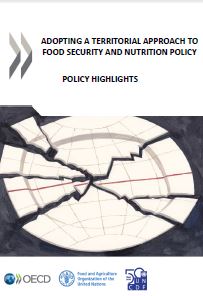 |
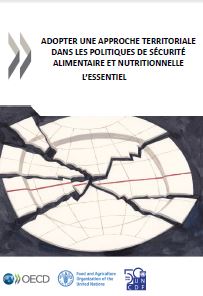 |
| Read the Policy highlights | Lire L'essentiel |
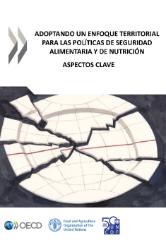 |
||
| Lea los aspectos clave |
Key Findings
The analysis developed in the case studies confirm the relevance of a territorial approach to food security and nutrition to support the design of effective policies and inclusive governance systems that can provide sustainable solutions to mitigate the effects of food insecurity over the medium and long term. It provides a useful framework to understand, analyse and capture: i) the multi-dimensional and multi-sectoral perspective of food security and nutrition, ii) the subnational geographic dimension of socio-economic inequalities and food insecurity, iii) the interdependencies between the various levels of government in policy making, (iv) the opportunities to foster integration and ensure overall coherence with the institutional systems in place, (v) the important link between territorial development and food security, including local food system, and finally, (vi) the importance of social participation in the implementation of FSN policies.
The research confirms the need to go beyond national averages in addressing the problem of food security and poverty. Food insecurity and extreme poverty are often concentrated in specific geographic areas. The case studies confirmed the importance of targeting policies to fight food insecurity in very specific regions along with national measures. The publication identifies four key challenges for the implementation of an effective territorial approach to FSN:
(i) the need to go beyond agriculture, since agricultural interventions are important but not sufficient to adequately address food insecurity and malnutrition, along with geographic and income inequalities;
(ii) the need to promote multilevel governance systems by strengthening policy coordination at the central level and empowering decentralized government bodies and stakeholders;
(iii) the need to improve territorial information systems for an evidence based FSN policy; and
(iv) the need to link social policies with the competitiveness agenda.
Moving from concepts to action: implementing the recommendations
The joint FAO, OECD, UNCDF publication confirmed the effectiveness of the territorial approach to address food insecurity. The analysis and consultations with the key national and sub-national stakeholders reveals the areas of priority needed in country for improving food security levels through the lens of a territorial approach. The strong participation of the countries in the project and in the conference organized during Expo Milan 2015 confirmed their high interest in this innovative approach and their commitment to move towards a second phase focusing on the implementation of the recommendations.
At the same time, by contributing to and strengthening the spatial dimension of the SDGs, the second phase is intended to provide a means of implementation of the 2030 Agenda for Sustainable Development to enhance policy coherence for sustainable development (SDG target 17.14).
The strong interest of the countries to implement the policy recommendations identified in the first phase of the project provided a sense of urgency to move into the second phase of the project to start implementing the lessons learned. Evidence generated and lessons learned from the implementation phase will feed and inform the national, regional and global policy dialogue and the increasing interest on the spatial dimension of FSN such as the SDGs, Habitat III, CFS, and others.
Purpose and format of the event
The purpose of the event was to: i) present the main findings and policy recommendations of the joint FAO, OECD, UNCDF publication; ii) discuss the way forward and explore support to advance toward the second phase of the project on implementation.
A restricted round table discussion (participation subject to receipt of invitation letters) took place among officials from the FAO, OECD and UNCDF, high level representatives (Minister/Vice-Minister level) of involved countries, development partners interested in advancing the project, other international and regional organisations and international experts.
The first part of the event presented the findings of the publication. Countries representatives also presented their areas of priority for implementation. This was followed by a session where development partners provided their perspective and input. Finally, the three partner organisations defined the way forward on the basis of the outcomes of the discussion.
pHOTOS OF THE EVENT
 |
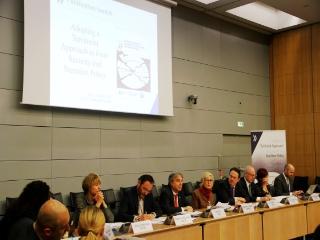 |
|
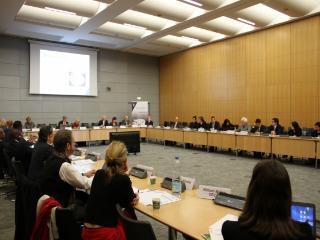 |
 |
|
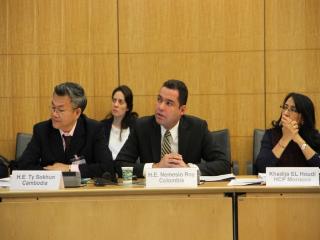 |
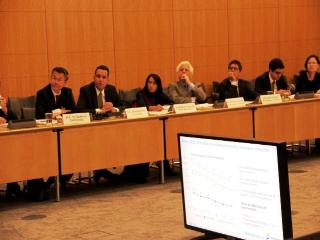 |
|
| |
Related Documents